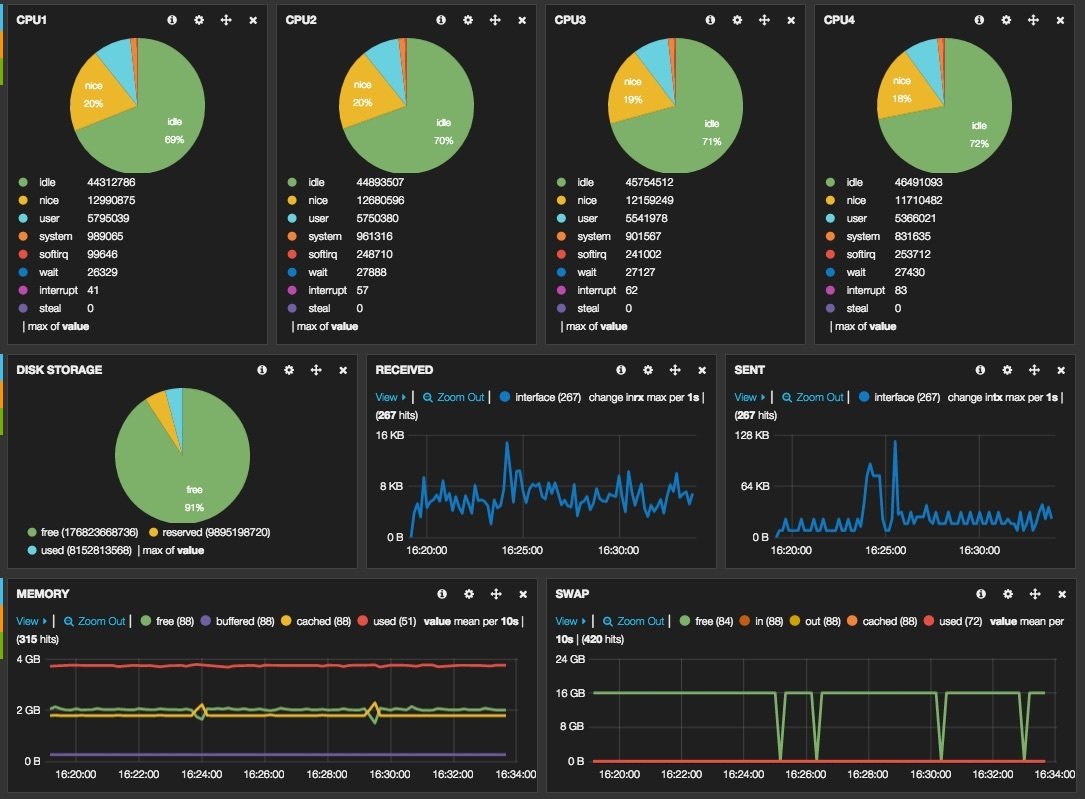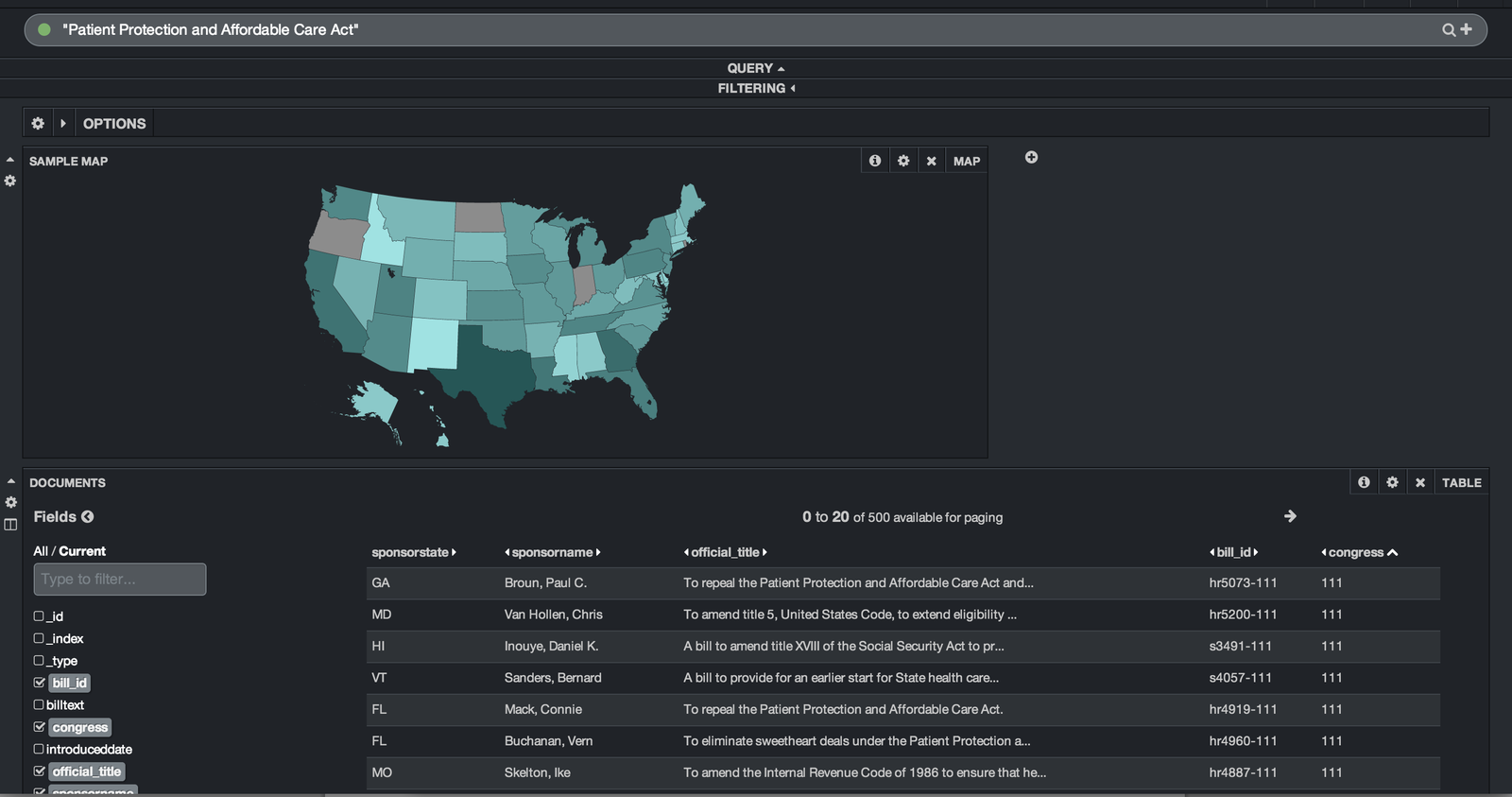The ELK Stack



Michael Recachinas
#python
#bigdata
#cloud
#machinelearning
#cuda
#foosball
Software Engineer at @Axios/LGS
Framing the problem
Too many
{computers, servers, VMs, containers}
to manage



source: http://kubernetes.io/
Too many plotting tools with their own APIs

Too many databases
- DB2
- MySQL
- Oracle
- PostgreSQL
- SQLite
- SQL Server
- Sybase
- RethinkDB
- CouchDB
- MariaDB
- BerkeleyDB
- Memcached
- Redis
- MongoDB
- Neo4j
- Cassandra
- GemStone
- AllegroGraph
- SimpleDB
- BigTable
- Drizzle
- Vertica
- DynamoDB
- GreenPlum
- MarkLogic
- Firebase
- Jackrabbit
- Scalaris
- Hbase
- Hypertable
- ... etc.
Elasticsearch
Open source, distributed, multitenant search server
Near real-time and percolating
Based on Lucene
HTTP web Interface
Schema-free JSON documents
Used by GitHub, Wikimedia, StumbleUpon, Mozilla, Quora, Foursquare, Etsy, SoundCloud, FDA, CERN, StackExchange, Netflix, Axios, etc.
Elasticsearch Config
- memory management
- server/cluster/shard configuration
- index settings
- log config
################################### Cluster ###################################
cluster.name: od-fts1
#################################### Node #####################################
node.name: "od-fts1a"
node.master: true
node.data: true
node.rack: ${RACK_ENV_VAR}
node.max_local_storage_nodes: 1
#################################### Index ####################################
index.number_of_shards: 2
index.number_of_replicas: 1
#################################### Paths ####################################
path.conf: /path/to/conf
path.data: /path/to/data
path.work: /path/to/work
path.logs: /path/to/logs
path.plugins: /path/to/plugins
#################################### Plugin ###################################
plugin.mandatory: mapper-attachments,lang-groovy
################################### Memory ####################################
bootstrap.mlockall: true
############################## Network And HTTP ###############################
network.bind_host: 192.168.0.1
network.publish_host: 192.168.0.1
network.host: 192.168.0.1
transport.tcp.port: 9300
transport.tcp.compress: true
http.port: 9200
http.max_content_length: 100mb
http.enabled: false
################################### Gateway ###################################
gateway.type: local
gateway.recover_after_nodes: 1
gateway.recover_after_time: 10m
gateway.expected_nodes: 2
action.auto_create_index: false
action.disable_close_all_indices: true
action.disable_delete_all_indices: true
action.disable_shutdown: true
############################# Recovery Throttling #############################
indices.recovery.max_bytes_per_sec: 100mb
indices.recovery.concurrent_streams: 5
################################## Discovery ##################################
discovery.zen.minimum_master_nodes: 1
discovery.zen.ping.timeout: 3s
discovery.zen.ping.multicast.enabled: true
################################## Slow Log ##################################
index.search.slowlog.threshold.query.warn: 10s
index.search.slowlog.threshold.query.info: 5s
index.search.slowlog.threshold.query.debug: 2s
index.search.slowlog.threshold.query.trace: 500ms
index.search.slowlog.threshold.fetch.warn: 1s
index.search.slowlog.threshold.fetch.info: 800ms
index.search.slowlog.threshold.fetch.debug: 500ms
index.search.slowlog.threshold.fetch.trace: 200ms
index.indexing.slowlog.threshold.index.warn: 10s
index.indexing.slowlog.threshold.index.info: 5s
index.indexing.slowlog.threshold.index.debug: 2s
index.indexing.slowlog.threshold.index.trace: 500ms
################################## GC Logging ################################
monitor.jvm.gc.ParNew.warn: 1000ms
monitor.jvm.gc.ParNew.info: 700ms
monitor.jvm.gc.ParNew.debug: 400ms
monitor.jvm.gc.ConcurrentMarkSweep.warn: 10s
monitor.jvm.gc.ConcurrentMarkSweep.info: 5s
monitor.jvm.gc.ConcurrentMarkSweep.debug: 2sLogstash
An open source tool for managing events and logs
Collect logs, parse them, and store them for later
Plugins for many data sources
logstash.conf
input {
tcp {
port => 5000
}
}
## Add your filters here
output {
elasticsearch {
hosts => "elasticsearch:9200"
}
}"input" is simply "where the data is coming from"
output is "where the data is going"
- tcp denotes that you can send log data via
nc localhost 5000 < foo.log- in our case, this is elasticsearch, which is located at that host and port
filters
filter {
grok {
match => { "message" => "%{COMBINEDAPACHELOG}" }
}
date {
match => [ "timestamp" , "dd/MMM/yyyy:HH:mm:ss Z" ]
}
}filters are in-line processing mechanisms that provide the flexibility to slice and dice your data to fit your needs
- in this case, we're telling logstash to grok (read: parse) the "message" field as an Apache log
- also, we're saying the date field is denoted by "timestamp", with the given format
Kibana
On the copa, copa Kibana

Open Source data visualization plugin for Elasticsearch
Written in HTML5, CSS3, and JS, using AngularJS

Sup @kevink
Kibana Config
Similar to configuring Elasticsearch, the kibana.yml config denotes server info, elasticsearch info, and log info


Kibana Config
# Kibana is served by a back end server. This setting specifies the port to use.
# server.port: 5601
# This setting specifies the IP address of the back end server.
# server.host: "0.0.0.0"
server.basePath: ""
server.maxPayloadBytes: 1048576
server.name: "your-hostname"
elasticsearch.url: "http://localhost:9200"
elasticsearch.preserveHost: true
kibana.index: ".kibana"
kibana.defaultAppId: "discover"
elasticsearch.username: "user"
elasticsearch.password: "pass"
server.ssl.cert: /path/to/your/server.crt
server.ssl.key: /path/to/your/server.key
elasticsearch.ssl.cert: /path/to/your/client.crt
elasticsearch.ssl.key: /path/to/your/client.key
elasticsearch.ssl.ca: /path/to/your/CA.pem
elasticsearch.ssl.verify: true
elasticsearch.pingTimeout: 1500
elasticsearch.requestTimeout: 30000
elasticsearch.requestHeadersWhitelist: [ authorization ]
elasticsearch.shardTimeout: 0
elasticsearch.startupTimeout: 5000
pid.file: /var/run/kibana.pid
logging.dest: stdout
logging.silent: false
logging.quiet: false
logging.verbose: false
ops.interval: 5000Demo
For the demo, we're using Docker-Compose



docker-compose.yml (v1)
elasticsearch:
image: elasticsearch:latest
command: elasticsearch -Des.network.host=0.0.0.0
ports:
- "9200:9200"
- "9300:9300"
logstash:
image: logstash:latest
command: logstash -f /etc/logstash/conf.d/logstash.conf
volumes:
- ./logstash/config:/etc/logstash/conf.d
ports:
- "5000:5000"
links:
- elasticsearch
kibana:
build: kibana/
volumes:
- ./kibana/config/:/opt/kibana/config/
ports:
- "5601:5601"
links:
- elasticsearchcontainer names are at the outermost level, with the reference image denoted by "image"
port-mappings are local:container
"command" is the command to run after the image is built and started
"build" is used if a sub-directory has a Dockerfile
"volumes" specifies volume-mappings from local:container
"links" link containers to another service; makes hostnames identical to the service name
docker-compose.yml (v2)
version: '2'
services:
elasticsearch:
image: elasticsearch:latest
command: elasticsearch -Des.network.host=0.0.0.0
ports:
- "9200:9200"
- "9300:9300"
logstash:
image: logstash:latest
command: logstash -f /etc/logstash/conf.d/logstash.conf
volumes:
- ./logstash/config:/etc/logstash/conf.d
ports:
- "5000:5000"
depends_on:
- elasticsearch
kibana:
build: kibana/
volumes:
- ./kibana/config/:/opt/kibana/config/
ports:
- "5601:5601"
depends_on:
- elasticsearchversion denotes which version of docker-compose this file is
links => depends_on
services now sits at the outer layer to describe what containers will be built and run
Plugins
Elasticsearch Plugins
What Elasticsearch plugins already exist?
- Phonetic
- Multicast
- Kubernetes
- ZooKeeper
- Watcher
- & more
Logstash Plugins
What logstash plugins already exist?
- stdin
- MongoDB
- Redis
- RabbitMQ
- CSV/JSON filter
- Syslog filter
- Apache filter
- & many more
Kibana Plugins
What Kibana plugins already exist?
- Wordcloud
- Vectormap
- Radar
- Slider
- Heatmap
- & others



Bonus Challenge
Build an Elasticsearch discovery plugin that performs (i.e., can index on) geospatial aggregations
(e.g., DBSCAN, L1-median, robust statistics, combining ellipses, circular error probable)
Thanks.

Sources
- https://wikipedia.org
- https://elastic.co
- https://github.com
- https://google.com